

Toño Bicicleta [Bicycle Tony]
(Prods. Internacionales Chaar Cacho, (c) 1975) Exec Prod: Lic. Jorge Luis Chaar
Cacho; Assoc Prod: Angelo
Malina, Rafael Ducos; Prod-Dir-Scr: Glauco del Mar; Dialog: Eduardo Davidson; Photo: Al Nieves; Music Dir: Héctor Granados; Theme Song: Zulma Angélica; "Tito's Odyssey": Tito
Puente; Prod Chief: Raffy Ducos;
Film Ed: Al Nieves; Makeup-Choreog-Costumes: Kali
Karlos
Cast: Tommy Vargas (detective who arrests Toño), Alida
Arizmendi (?Luz), Pola Mary (Gloria), Gladys Núñez, Amalia Cruz,
Chucho Nessy, Colón Riozama (Antonio
García López aka Toño Bicicleta), doña Antonia López Vargas (mother of Toño), José Sánchez,
Zulma Angélica, Carmen Montijo, Kuky Rohena, Angelo (hair stylist), Félix (the judge), Alex (the man with the beard), Rafael
Ducos, Mike Ramos, San Son Batalla, Pachito, Elvía Córdova, Ernesto
Concepción, Manuel Rivera Colón "El Mamito," Silvia de Grasse
Vedettes (dancers), Los Alegres
Tres, Emilio Soto, Felipe Pérez Valentino, Ramón Varlela "Papo,"
Luis Alberto Font "El Pitirre," Ismael Ruiz Javier
"Kissinger," Edgardo Delgado (Pucho), José Luis Pérez (Fidel), Criminalda Rodríguez (Tita), Blanca de Vargas, Zahika
Chaar Urbiñas, Jorgito Chaar de la Cruz, Julie Edna Ducos, Carlitos Ducos,
Rafaelito Ducos, Michelle del Valle, Carlos Cruz del Valle, Robert Lee
Spreng, Jenny Medina, Víctor Hugo Soto, Lizzy Acevedo


Notes: "Toño Bicicleta"
was a real-life Puerto Rican criminal arrested for murder in 1968, who
subsequently escaped from prison several times and led a life of crime
until his death at the hands of the police in 1995. At least three movies have been produced
about his activities, including two in 1975--Glauco del Mar's Toño Bicicleta and Toño Bicicleta: El fugitivo de Puerto
Rico (dir. José Donate). Del
Mar's version of the events is a very long (114 minutes) and at times
frustrating cinematic experience, stylistically nearly 180-degrees away
from his realistic and taut crime thriller El Callao.
Toño Bicicleta consists of some
"traditional" narrative sequences that alternate with fantasy
scenes, flowery passages of philosophical voiceover narration and
extremely long montage sequences with musical accompaniment. Del Mar also uses attention-grabbing
devices such as radio broadcasts, quick-cut montage and freeze-frame
sequences, and printed titles (probably meant to represent newspaper
headlines) superimposed over live-action footage. Clearly, using these techniques was a
deliberate attempt at a non-traditional narrative
picture. The result is
cinematically interesting but hardly entertaining for the casual
spectator.
After a "teaser"
sequence in which Toño abducts a man's wife, the film's first
"fantasy" sequence unreels, a musical production number which
concludes with Toño and his bride arriving at some seaside ruins. A more traditional sequence follows: a
barbecue, cockfight, and party--attended by Toño and Alfredo (as yet
unidentified)--concludes with a third man toasting the buxom blonde
Gloria. Toño, although a married
father of three, falls in love with Gloria. Gloria takes her young child to New York
City but promises to return someday. Meanwhile, Alfredo courts Toño's wife Alicia, leading to a
long fight between the two men. [This is the film's first extended montage sequence, beginning with
a machete duel in a barn, then a fist fight across the countryside, and
concluding when the men fall into a river or lake. This goes on so long that it
becomes rather silly--I guess it could be compared to the epic battle in
John Ford's The Quiet Man, which
is also somewhat parodic.] Gloria
returns to Puerto Rico and Alfredo gleefully tells Toño she now has a
husband. Visiting his former lover
at her mother's house, Toño suddenly takes his machete and slashes her to
death! [A shocking scene with several split-second "gore"
closeups, this is slightly marred by the husband's off-screen voice
saying, in English, "Why did you do that?" in a petulant tone
more appropriate for chastizing a small child who has
misbehaved.]
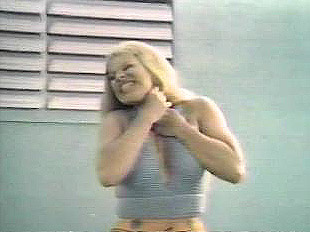
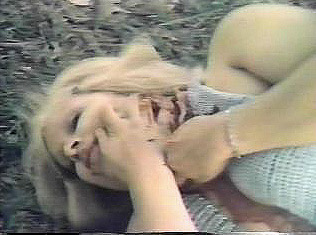
[Another long sequence
follows. This one is so
protracted that my notes read THIS GOES ON FOREVER. It actually runs around nine
minutes.] A detective trails Toño's
wife Alicia as she changes into a variety of disguises and performs
various evasive maneuvers before
arriving at his hideout. Toño is
arrested and pleads guilty and is sentenced to 10-15 years at hard labor
for second-degree murder. [The
"trial" is held in a park, with a few spectators seated on
benches or strolling by. Since I
know they have courthouses in Puerto Rico, this is clearly a
"fantasy" type sequence but it's really puzzling.] In the prison shower, Toño is surrounded
by men and (presumably) assaulted. Alicia visits him and says she is going
to have Alfredo's baby: "I know you can kill me if you wish, you
could cut off my head like you did to Gloria."
Toño escapes. [Another long (6 minutes) montage sequence, scored to Tito Puente's
"Tito's Odyssey," as Toño crosses the countryside to get
home.] He is reunited with his
mother [played by the real-life mother of the actual Toño Bicicleta] then
leaves for the big city. [Six more minutes are expended on scenes of
carnival-type celebrations and Toño out on the town with some pals.] His friends set him up with a new
identity and he flees to the USA, but soon returns home. [We never see
Toño in New York, voiceover narration merely mentions
it.]
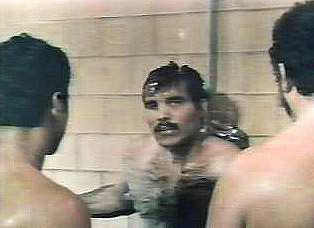
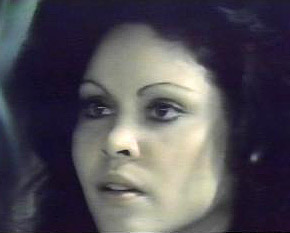

Toño abducts a former girlfriend,
Luz, and takes her to a ruined villa by the sea, where she falls in love
with him once more. Then (for some
reason), he kidnaps another former girlfriend Auria and takes her
back to the ruins, where he begins an idyllic menage-a-trois with the women. [6
more minutes of lyrical scenes, music, voiceover poetry.] Various narrow escapes follow [one lasts
nearly 7 minutes], and eventually Toño is separated from both Luz and
Auria.
Toño's mother makes public appeals for him to
surrender. A $15,000 reward is
offered for his capture. This leads
to a nation-wide manhunt and some tragic mistakes: "Police Wound
Youth Confused With Fugitive Toño Bicicleta," and "Police
Investigated for the Death of Toño's Grandfather.", and eventually
he's caught by a mob of people (who argue about the money even as they are
subduing him). "The Arrest of
Toño Bicicleta Ends a Tremendous Nightmare for PR Police," a
superimposed title reads. The film
concludes with more philosophical voiceover
narration.
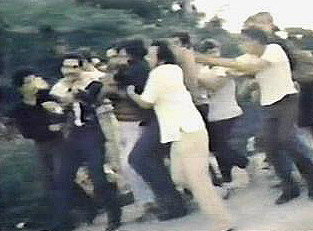
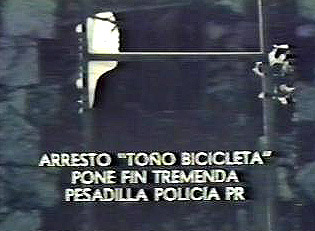
Toño
Bicicleta is rather confusing in
its intent. If the film had some
specific political or social intent, I was unable to discern it (although,
not being Puerto Rican, I don't have the cultural background to pick up on
certain nuances). Although
generally a sympathetic figure, Toño is not depicted as an innocent man, a
"Robin Hood," or a political prisoner, despite the suggestion
toward the end of the movie that his crime spree is embarassing to the
police. His murder of Gloria can be
attributed to a moment of blind jealousy and he pleads guilty to the
crime, but is unable to endure prison. However, he doesn't merely escape from jail and try to resume a
normal life, he becomes a serial kidnaper and rapist (admittedly, one
whose victims later willingly stay with him), in addition to committing
lesser crimes (such as robbery). [A
superimposed title says he was found guilty in 28 cases.] Sent to "freedom" in New York
City, Toño deliberately (and foolishly, one might think) returns to Puerto
Rico, although in the context of the movie it's explained that Toño
couldn't live away from his beloved homeland. It's interesting to note that Toño is
finally caught by a mob of normal, working-class people--not the
police--and not protected by them as one might expect.
Filmed mostly on location in Puerto
Rico--except for a few scenes of Gloria and her son window-shopping in New
York City--Toño Bicicleta bears
little resemblance to Glauco del Mar's other directorial efforts, although
some traces of his style can still be discerned (giant closeups, scenes of
showgirls, etc.) and the prodigious amount of philosophical voiceover
narration amplifies a similar sequence at the end of Tigresa. While both Al Nieves and Eduardo
Davidson had worked with del Mar before, none of del Mar's stock company
of performers appear. Colón Riozama
can be seen in
Santo en Oro
Negro (1974), a Mexican-Puerto Rican coproduction, and Pola Mary
(or
Mari) has a brief role in Ye Yo,
while Tommy Vargas and Alida Arizmendi were fairly well-known actors in
Puerto Rico.
I am not sure, but the producer of this movie--Licenciado Jorge Luis
Chaar Cacho--is probably the same individual who in 1975 was convicted of
murdering a wealthy client and sent to prison for 12 years. Chaar Cacho
wrote a best-selling book about his ordeal (he maintained his innocence
and indicated he was framed for the crime) entitled "Maldita sea la
justicia" (1992). Added note: at least one source
indicates Chaar Cacho was the lawyer of "Toño Bicicleta"
in real-life, so this might explain his involvement with the movie.
UPDATE 22 Feb 2021:
Toño Bicicleta was shown theatrically in Bayshore, NY in December 1975.
Page created 19 December 2007 by D. Wilt (dwiltNOSPAM@umd.edu Remove NOSPAM to email me) Update 10 Feb 2022 to fix html errors.
